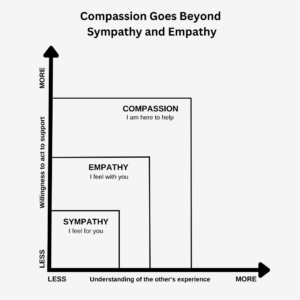
As human resource professionals, empathy, sympathy, and compassion are essential skills to have in our toolkit, but they should be applied in different ways depending on the situation. These skills not only help us connect with our colleagues and employees but also play a crucial role to maintain objectivity, fairness in their decision-making and building a positive work culture.
Let’s understand empathy, sympathy, and compassion and how they differ from each other and how they can be applied in the context of Human Resources?
Empathy, sympathy, and compassion are three distinct concepts, although they are often used interchangeably. They all represent positive, altruistic traits, but they don’t refer to the exact same experience. It is helpful to consider the two distinct qualities of compassion: understanding what another is feeling, and the willingness to act to alleviate suffering for another. The following image visually distinguishes compassion from the similar experiences of empathy, sympathy:

What is empathy?
Empathy is the ability to understand and share the feelings of another person. It involves both emotional and cognitive components and is essential for building strong relationships and promoting social connection. Empathy is not the same as agreeing with someone or feeling the same way about a situation. It means putting yourself in someone else’s shoes and experiencing what they are feeling
One way to cultivate empathy is through mindfulness and active listening. This involves paying attention to the other person’s words and nonverbal cues, trying to see things from their perspective, and demonstrating understanding and validation of their feelings. For example, you might say something like, “I can see how that would be frustrating for you. I’m here to listen and see if there is anything I can do to help.”
Another way to practice empathy is through perspective-taking, which involves trying to understand and appreciate the thoughts, feelings, and experiences of others. This can be done through activities such as role-playing, where you imagine yourself in someone else’s shoes and try to understand their perspective.
What is sympathy?
Sympathy is the feeling of concern, sadness, or pity for someone else’s suffering or misfortune. It is a natural response to hearing about someone’s struggles and can be comforting to the person experiencing the hardship. While sympathy can also be a helpful quality for HR professionals to have. However, sympathy is a one-sided emotion and does not necessarily involve a deep understanding of the other person’s feelings or perspective.
What is compassion?
Compassion is a deeper form of empathy that involves not only feeling the other person’s pain but also being moved to take action to alleviate it. Compassion is a combination of empathy and action; it involves a desire to help and a willingness to take steps to do so. Compassion involves understanding the other person’s experience and perspective and taking action to support them.
How can empathy, sympathy, and compassion be applied in HR?
As HR professionals, it is essential to practice empathy, sympathy, and compassion in our daily interactions with colleagues and employees. This can involve actively listening to their concerns and trying to see things from their perspective, demonstrating understanding and validation of their feelings, and taking action to support them.
For example, if an employee comes to you with a concern about a difficult situation they are experiencing at work, empathy might involve actively listening to their concerns and trying to feel what a employee is feeling, while sympathy might involve trying to understand their feelings and compassion might involve not only expressing your concern and understanding of their feelings but also taking action to help them find a solution or support them in any way you can to relieve them from suffering.
In conclusion, empathy, sympathy, and compassion are critical skills for HR professionals to possess, and incorporating them into their daily work can have a positive impact on both the employees and the organization as a whole. Empathy involves the ability to truly understand and experience the emotions of others, while sympathy is a one-sided feeling of concern or pity, and compassion involves both feeling sympathy and a desire to help alleviate suffering. Moreover, practicing empathy, sympathy, and compassion can also help HR professionals better understand the needs of their employees and create programs and policies that align with those needs. This can result in better retention rates, increased job satisfaction, and improved overall company culture. It can also be helpful in conflict resolution, as understanding the other person’s perspective and emotions can help us address and resolve.

